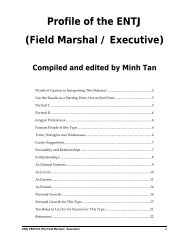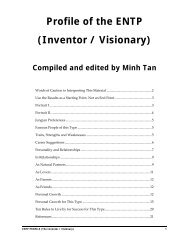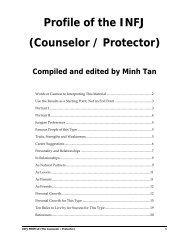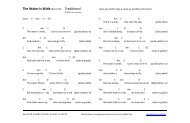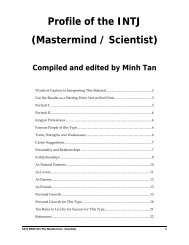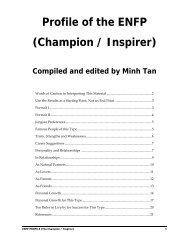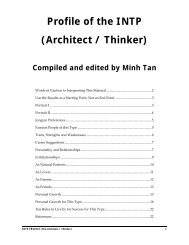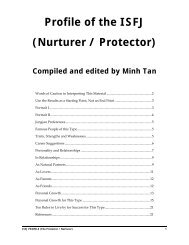Profile of the ISTJ (Inspector / Duty Fulfiller) - Digital Citizen
Profile of the ISTJ (Inspector / Duty Fulfiller) - Digital Citizen
Profile of the ISTJ (Inspector / Duty Fulfiller) - Digital Citizen
Create successful ePaper yourself
Turn your PDF publications into a flip-book with our unique Google optimized e-Paper software.
<strong>Pr<strong>of</strong>ile</strong> <strong>of</strong> <strong>the</strong> <strong>ISTJ</strong><br />
(<strong>Inspector</strong> / <strong>Duty</strong> <strong>Fulfiller</strong>)<br />
Compiled and edited by Minh Tan<br />
Words <strong>of</strong> Caution to Interpreting This Material ..................................................... 2<br />
Use <strong>the</strong> Results as a Starting Point, Not an End Point ........................................... 3<br />
Portrait I ........................................................................................................................ 3<br />
Portrait II ....................................................................................................................... 4<br />
Jungian Preferences ..................................................................................................... 5<br />
Famous People <strong>of</strong> this Type ....................................................................................... 5<br />
Traits, Strengths and Weaknesses ............................................................................. 6<br />
Career Suggestions ...................................................................................................... 7<br />
Personality and Relationships ................................................................................... 7<br />
In Relationships ........................................................................................................... 9<br />
As Natural Partners ................................................................................................... 10<br />
As Lovers .................................................................................................................... 11<br />
As Parents ................................................................................................................... 12<br />
As Friends ................................................................................................................... 13<br />
Personal Growth ........................................................................................................ 14<br />
Personal Growth for This Type ............................................................................... 16<br />
Ten Rules to Live by for Success for This Type ..................................................... 20<br />
References ................................................................................................................... 21<br />
<strong>ISTJ</strong> PROFILE (The <strong>Inspector</strong> / <strong>Duty</strong> <strong>Fulfiller</strong>) 1
This document contains detailed information about <strong>the</strong> <strong>ISTJ</strong> Jung personality pr<strong>of</strong>ile. The content<br />
references concepts already mentioned in <strong>the</strong> document called Understanding your Personality<br />
Assessment Results, which can be found on <strong>the</strong> <strong>Digital</strong> <strong>Citizen</strong> website. If you are reading this<br />
and do not understand some <strong>of</strong> <strong>the</strong> content, please refer to <strong>the</strong> referenced document.<br />
This personality pr<strong>of</strong>ile comes with <strong>the</strong> following analysis:<br />
• Portraits (summaries)<br />
• Traits, strengths and weaknesses<br />
• Possible career paths<br />
• Relationships (strengths, weaknesses, lovers, Parents, friends)<br />
• Personal growth (success, happiness, problems, solutions, rules to live by)<br />
The analyses here combine work done by Carl Jung, Katharine Cook Briggs and her daughter,<br />
Isabel Briggs Myers, and David Keirsey. Myers & Briggs built <strong>the</strong>ir work on Jung’s, and Keirsey<br />
expanded and revised some <strong>of</strong> <strong>the</strong>ir work. At times, <strong>the</strong> outcomes conflict in small ways, and <strong>the</strong>y<br />
are noted. However, all <strong>the</strong>ir works are presented for you to embrace whichever appeals to you.<br />
A read <strong>of</strong> <strong>the</strong> Keirsey Temperament documents, found on <strong>the</strong> <strong>Digital</strong> <strong>Citizen</strong> website, is highly<br />
recommended if you want to know more about a pr<strong>of</strong>ile’s tendencies beyond what is here. The<br />
document you want is <strong>the</strong> one with Preference letters found in <strong>the</strong> pr<strong>of</strong>ile you want.<br />
Words <strong>of</strong> Caution in Interpreting This Material<br />
The biggest mistake I <strong>of</strong>ten see with <strong>the</strong> presentation <strong>of</strong> personality assessment results is that<br />
<strong>the</strong>y are spoken <strong>of</strong> in absolute terms, when <strong>the</strong>y should be discussed as majority tendencies.<br />
You got a percentage score with each <strong>of</strong> your Jung type preferences (letter) if you took <strong>the</strong> test<br />
I supplied. That score is an indication <strong>of</strong> how strong you have those tendencies. A 75% score<br />
on Thinking, for example, means you rely on Thinking about 75% <strong>of</strong> <strong>the</strong> time to make decisions<br />
ra<strong>the</strong>r than Feelings. But it also means you use or value Feelings 25% <strong>of</strong> <strong>the</strong> time, ra<strong>the</strong>r than<br />
that you are a Thinking decision-maker all <strong>of</strong> <strong>the</strong> time. You have to keep <strong>the</strong>se percentages<br />
in mind when interpreting this content as it may apply to you or someone else.<br />
Do NOT compare your percentage scores with someone else’s as if <strong>the</strong>y were absolute. That<br />
is, if you had a 75% Thinking score, that does not mean you are more logical than someone<br />
with a 65% Thinking score. The best way I can think to illustrate this is with an analogy. Your<br />
percentage is like how you break up your “pie”, where <strong>the</strong> whole is both Preferences (Thinking<br />
and Feeling here). Someone could have a 55% Thinking score & be more logical in <strong>the</strong>ir decisionmaking<br />
than you. That’s because <strong>the</strong>ir “pie” might be bigger than yours. They may put more<br />
<strong>of</strong>, both, Thinking and Feeling, into <strong>the</strong>ir decision-making, or may be capable <strong>of</strong> more complex<br />
logical decision-making than you. They just don’t rely on Thinking 75% <strong>of</strong> <strong>the</strong> time like you.<br />
That’s all those percentages mean, so keep your % scores only for your own comparison.<br />
While it may more convenient, less convoluted and more convincing to discuss your results in<br />
absolute terms, it is not true. People are complex and <strong>the</strong>re’s no way <strong>of</strong> “dumbing <strong>the</strong>m down”<br />
to understand <strong>the</strong>m. All that does is ei<strong>the</strong>r create misunderstandings or skepticism in <strong>the</strong> results.<br />
Compiled and edited by Minh Tan, digitalcitizen.ca 2
Use <strong>the</strong> Results as a Starting Point, Not an End Point<br />
Jung’s personality type results are generalized, so <strong>the</strong>y can be used as prejudice if you use<br />
<strong>the</strong>m as an end point to judge o<strong>the</strong>rs. This is true if you use <strong>the</strong> results to judge individuals and<br />
condemn <strong>the</strong>m to certain behaviours all <strong>of</strong> <strong>the</strong> time, when you know it is only true more times<br />
than not. It is also unfair to expect all people <strong>of</strong> a certain personality type to all behave <strong>the</strong> same<br />
way given a certain situation, as each has freedom to behave any way in any certain situations.<br />
Humans are not preprogrammed machines. We do not behave with absolute consistency. We just<br />
have tendencies. We are creatures <strong>of</strong> habit, not logic. As a result, use <strong>the</strong> Jung personality type<br />
results as a starting point to understand each o<strong>the</strong>r, not an end point to condemn each o<strong>the</strong>r.<br />
Portrait I – The <strong>Inspector</strong><br />
In <strong>the</strong> Keirsey Temperament version <strong>of</strong> <strong>the</strong> Jung personality type system, <strong>the</strong> <strong>ISTJ</strong> pr<strong>of</strong>ile is<br />
known as <strong>the</strong> <strong>Inspector</strong>, though this is meant to be career advice. Here is Keirsey’s description.<br />
The one word that best describes <strong>Inspector</strong>s is super-dependable. Whe<strong>the</strong>r at home or at work,<br />
<strong>Inspector</strong>s are extraordinarily persevering and dutiful, particularly when it comes to keeping<br />
an eye on <strong>the</strong> people and products <strong>the</strong>y are responsible for. In <strong>the</strong>ir quiet way, <strong>Inspector</strong>s see<br />
to it that rules are followed, laws are respected, and standards are upheld.<br />
<strong>Inspector</strong>s (as much as 10 percent <strong>of</strong> <strong>the</strong> general population) are <strong>the</strong> true guardians <strong>of</strong> institutions.<br />
They are patient with <strong>the</strong>ir work and with <strong>the</strong> procedures within an institution, although not<br />
always with <strong>the</strong> unauthorized behavior <strong>of</strong> some people in that institution. Responsible to <strong>the</strong><br />
core, <strong>Inspector</strong>s like it when people know <strong>the</strong>ir duties, follow <strong>the</strong> guidelines, and operate within<br />
<strong>the</strong> rules. For <strong>the</strong>ir part, <strong>Inspector</strong>s will see to it that goods are examined and schedules are kept,<br />
that resources will be up to standards and delivered when and where <strong>the</strong>y are supposed to be.<br />
And <strong>the</strong>y would prefer that everyone be this dependable. <strong>Inspector</strong>s can be hard-nosed about<br />
<strong>the</strong> need for following <strong>the</strong> rules in <strong>the</strong> workplace, and do not hesitate to report irregularities<br />
to <strong>the</strong> proper authorities. Because <strong>of</strong> this <strong>the</strong>y are <strong>of</strong>ten misjudged as being hard-hearted, or<br />
as having ice in <strong>the</strong>ir veins, for people fail to see <strong>the</strong>ir good intentions and <strong>the</strong>ir vulnerability<br />
to criticism. Also, because <strong>Inspector</strong>s usually make <strong>the</strong>ir inspections without much flourish<br />
or fanfare, <strong>the</strong> dedication <strong>the</strong>y bring to <strong>the</strong>ir work can go unnoticed and unappreciated.<br />
While not as talkative as Supervisor Guardians (ESTJs), <strong>Inspector</strong>s are still highly sociable,<br />
and are likely to be involved in community service organizations, such as Sunday School,<br />
Little League, or Boy and Girl Scouting, that transmit traditional values to <strong>the</strong> young. Like<br />
all Guardians, <strong>Inspector</strong>s hold dear <strong>the</strong>ir family social ceremonies-weddings, birthdays, and<br />
anniversaries – although <strong>the</strong>y tend to be shy if <strong>the</strong> occasion becomes too large or too public.<br />
Generally speaking, <strong>Inspector</strong>s are not comfortable with anything that gets too fancy. Their<br />
words tend to be plain and down-to-earth, not showy or high-flown. Their clo<strong>the</strong>s are <strong>of</strong>ten<br />
simple and conservative ra<strong>the</strong>r than <strong>of</strong> <strong>the</strong> latest fashion. Their home and work environments are<br />
usually neat, orderly, and traditional, ra<strong>the</strong>r than trendy or ostentatious. As for personal property,<br />
<strong>the</strong>y usually choose standard items over models loaded with features, and <strong>the</strong>y <strong>of</strong>ten try to<br />
find classics and antiques – <strong>Inspector</strong>s prefer <strong>the</strong> old-fashioned to <strong>the</strong> newfangled every time.<br />
<strong>ISTJ</strong> PROFILE (The <strong>Inspector</strong> / <strong>Duty</strong> <strong>Fulfiller</strong>) 3
Portrait II – The <strong>Duty</strong> <strong>Fulfiller</strong><br />
The <strong>ISTJ</strong> pr<strong>of</strong>ile is <strong>of</strong>ten called <strong>the</strong> <strong>Duty</strong> <strong>Fulfiller</strong>. This is how <strong>the</strong> <strong>ISTJ</strong> pr<strong>of</strong>ile is also <strong>of</strong>ten<br />
summarized.<br />
As an <strong>ISTJ</strong>, your primary mode <strong>of</strong> living is focused internally, where you take things in via your<br />
five senses in a literal, concrete fashion. Your secondary mode is external, where you deal with<br />
things rationally and logically.<br />
<strong>ISTJ</strong>s are quiet and reserved individuals who are interested in security and peaceful living. They<br />
have a strongly-felt internal sense <strong>of</strong> duty, which lends <strong>the</strong>m a serious air and <strong>the</strong> motivation to<br />
follow through on tasks. Organized and methodical in <strong>the</strong>ir approach, <strong>the</strong>y can generally succeed<br />
at any task which <strong>the</strong>y undertake.<br />
<strong>ISTJ</strong>s are very loyal, faithful & dependable. They place great importance on honesty & integrity.<br />
They are “good citizens” who can be depended on to do <strong>the</strong> right thing for <strong>the</strong>ir families and<br />
communities. While <strong>the</strong>y generally take things very seriously, <strong>the</strong>y also usually have an <strong>of</strong>fbeat<br />
sense <strong>of</strong> humor and can be a lot <strong>of</strong> fun – especially at family or work-related ga<strong>the</strong>rings.<br />
<strong>ISTJ</strong>s tend to believe in laws and traditions, and expect <strong>the</strong> same from o<strong>the</strong>rs. They’re not<br />
comfortable with breaking laws or going against <strong>the</strong> rules. If <strong>the</strong>y are able to see a good reason<br />
for stepping outside <strong>of</strong> <strong>the</strong> established mode <strong>of</strong> doing things, <strong>the</strong> <strong>ISTJ</strong> will support that effort.<br />
However, <strong>ISTJ</strong>s more <strong>of</strong>ten tend to believe that things should be done according to procedures<br />
and plans. If an <strong>ISTJ</strong> has not developed <strong>the</strong>ir iNtuitive side sufficiently, <strong>the</strong>y may become<br />
overly obsessed with structure, and insist on doing everything “by <strong>the</strong> book”.<br />
The <strong>ISTJ</strong> is extremely dependable on following through with things which he or she has<br />
promised. For this reason, <strong>the</strong>y sometimes get more and more work piled on <strong>the</strong>m. Because<br />
<strong>the</strong> <strong>ISTJ</strong> has such a strong sense <strong>of</strong> duty, <strong>the</strong>y may have a difficult time saying “no” when<br />
<strong>the</strong>y are given more work than <strong>the</strong>y can reasonably handle. For this reason, <strong>the</strong> <strong>ISTJ</strong> <strong>of</strong>ten<br />
works long hours, and may be unwittingly taken advantage <strong>of</strong>.<br />
The <strong>ISTJ</strong> will work for long periods <strong>of</strong> time and put tremendous amounts <strong>of</strong> energy into doing<br />
any task which <strong>the</strong>y see as important to fulfilling a goal. However, <strong>the</strong>y will resist putting<br />
energy into things which don’t make sense to <strong>the</strong>m, or for which <strong>the</strong>y can’t see a practical<br />
application. They prefer to work alone, but work well in teams when <strong>the</strong> situation demands<br />
it. They like to be accountable for <strong>the</strong>ir actions, and enjoy being in positions <strong>of</strong> authority.<br />
The <strong>ISTJ</strong> has little use for <strong>the</strong>ory or abstract thinking, unless <strong>the</strong> practical application is clear.<br />
<strong>ISTJ</strong>s have tremendous respect for facts. They hold a tremendous store <strong>of</strong> facts within<br />
<strong>the</strong>mselves, which <strong>the</strong>y have ga<strong>the</strong>red through <strong>the</strong>ir Sensing preference. They may have<br />
difficulty understanding a <strong>the</strong>ory or idea which is different from <strong>the</strong>ir own perspective.<br />
However, if <strong>the</strong>y are shown <strong>the</strong> importance or relevance <strong>of</strong> <strong>the</strong> idea to someone who <strong>the</strong>y<br />
respect or care about, <strong>the</strong> idea becomes a fact, which <strong>the</strong> <strong>ISTJ</strong> will internalize and support.<br />
Once <strong>the</strong> <strong>ISTJ</strong> supports a cause or idea, he or she will stop at no lengths to ensure that <strong>the</strong>y<br />
are doing <strong>the</strong>ir duty <strong>of</strong> giving support where support is needed.<br />
Compiled and edited by Minh Tan, digitalcitizen.ca 4
The <strong>ISTJ</strong> is not naturally in tune with <strong>the</strong>ir own feelings and <strong>the</strong> feelings <strong>of</strong> o<strong>the</strong>rs. They may have<br />
difficulty picking up on emotional needs immediately, as <strong>the</strong>y are presented. Being perfectionists<br />
<strong>the</strong>mselves, <strong>the</strong>y have a tendency to take o<strong>the</strong>r people’s efforts for granted, like <strong>the</strong>y take <strong>the</strong>ir<br />
own efforts for granted. They need to remember to pat people on <strong>the</strong> back once in a while.<br />
<strong>ISTJ</strong>s are likely to be uncomfortable expressing affection and emotion to o<strong>the</strong>rs. However, <strong>the</strong>ir<br />
strong sense <strong>of</strong> duty and <strong>the</strong> ability to see what needs to be done in any situation usually allows<br />
<strong>the</strong>m to overcome <strong>the</strong>ir natural reservations, and <strong>the</strong>y are usually quite supporting and caring<br />
individuals with <strong>the</strong> people that <strong>the</strong>y love. Once <strong>the</strong> <strong>ISTJ</strong> realizes <strong>the</strong> emotional needs <strong>of</strong> those<br />
who are close to <strong>the</strong>m, <strong>the</strong>y put forth effort to meet those needs.<br />
The <strong>ISTJ</strong> is extremely faithful and loyal. Traditional and family-minded, <strong>the</strong>y will put forth great<br />
amounts <strong>of</strong> effort at making <strong>the</strong>ir homes and families running smoothly. They are responsible<br />
parents, taking <strong>the</strong>ir parenting roles seriously. They are usually good and generous providers<br />
to <strong>the</strong>ir families. They care deeply about those close to <strong>the</strong>m, although <strong>the</strong>y usually are not<br />
comfortable with expressing <strong>the</strong>ir love. The <strong>ISTJ</strong> is likely to express <strong>the</strong>ir affection through<br />
actions, ra<strong>the</strong>r than through words.<br />
<strong>ISTJ</strong>s have an excellent ability to take any task and define it, organize it, plan it, and implement<br />
it through to completion. They are very hard workers, who do not allow obstacles to get in <strong>the</strong><br />
way <strong>of</strong> performing <strong>the</strong>ir duties. They do not usually give <strong>the</strong>mselves enough credit for <strong>the</strong>ir<br />
achievements, seeing <strong>the</strong>ir accomplishments simply as <strong>the</strong> natural fulfillment <strong>of</strong> <strong>the</strong>ir obligations.<br />
<strong>ISTJ</strong>s usually have a great sense <strong>of</strong> space and function, and artistic appreciation. Their homes<br />
are likely to be tastefully furnished and immaculately maintained. They are acutely aware <strong>of</strong><br />
<strong>the</strong>ir senses, and want to be in surroundings which fit <strong>the</strong>ir need for structure, order, and beauty.<br />
Under stress, <strong>ISTJ</strong>s may fall into “catastrophe mode”, where <strong>the</strong>y see nothing but all <strong>of</strong> <strong>the</strong><br />
possibilities <strong>of</strong> what could go wrong. They will berate <strong>the</strong>mselves for things which <strong>the</strong>y should<br />
have done differently, or duties which <strong>the</strong>y failed to perform. They will lose <strong>the</strong>ir ability to<br />
see things calmly and reasonably, and will depress <strong>the</strong>mselves with <strong>the</strong>ir visions <strong>of</strong> doom.<br />
In general, <strong>the</strong> <strong>ISTJ</strong> has a tremendous amount <strong>of</strong> potential. Capable, logical, reasonable, and<br />
effective individuals with a deeply driven desire to promote security and peaceful living, <strong>the</strong> <strong>ISTJ</strong><br />
has what it takes to be highly effective at achieving <strong>the</strong>ir chosen goals – whatever <strong>the</strong>y may be.<br />
Jungian Preference Ordering<br />
• Dominant: Introverted Sensing<br />
• Auxiliary: Extraverted Thinking<br />
• Tertiary: Introverted Feeling<br />
• Inferior: Extraverted iNtuition<br />
Famous <strong>Inspector</strong>s<br />
• Warren Buffett<br />
• Queen Elizabeth II<br />
• Harry S. Truman<br />
• John D. Rockefeller<br />
• Queen Victoria<br />
• James K. Polk<br />
• Andrea Mitchell<br />
• Roy Disney<br />
<strong>ISTJ</strong> PROFILE (The <strong>Inspector</strong> / <strong>Duty</strong> <strong>Fulfiller</strong>) 5
• Thurgood Marshall<br />
<strong>ISTJ</strong> Traits, Strengths and Weaknesses<br />
Whe<strong>the</strong>r you’re a young adult trying to find your place in <strong>the</strong> world, or a not-so-young adult<br />
trying to find out if you’re moving along <strong>the</strong> right path, it’s important to understand yourself<br />
and <strong>the</strong> personality traits which will impact your likeliness to succeed or fail at various careers.<br />
It’s equally important to understand what is really important to you. When armed with an<br />
understanding <strong>of</strong> your strengths and weaknesses, and an awareness <strong>of</strong> what you truly value,<br />
you are in an excellent position to pick a career which you will find rewarding.<br />
<strong>ISTJ</strong>s generally have <strong>the</strong> following traits:<br />
• Value tradition, security, and peaceful living<br />
• Will work long and hard to fulfill duties<br />
• Can be depended on to follow through on tasks<br />
• Loyal and faithful<br />
• Stable, practical and down-to-earth<br />
• Family-minded<br />
• Dislike doing things which don’t make sense to <strong>the</strong>m<br />
• Dislike abstract <strong>the</strong>ory, unless <strong>the</strong>y see <strong>the</strong> practical application<br />
• Natural leaders<br />
• Prefer to work alone, but work well in teams when necessary<br />
• Extremely observant, <strong>the</strong>y take in facts via <strong>the</strong>ir senses and store <strong>the</strong>m internally<br />
• Vast, rich inner store <strong>of</strong> facts which <strong>the</strong>y rely on to understand problems which <strong>the</strong>y<br />
encounter in <strong>the</strong>ir lives<br />
• Pr<strong>of</strong>ound respect for facts and concrete information<br />
• Make decisions objectively, applying logic and rational thinking<br />
• Dislike change, unless <strong>the</strong>y are shown it’s benefit in a concrete way<br />
• Have strong opinions about <strong>the</strong> way things should be done<br />
• Appreciate structured, orderly environments<br />
• Have very high standards for <strong>the</strong>ir own behavior and <strong>the</strong> behavior <strong>of</strong> o<strong>the</strong>rs<br />
• Not naturally in-tune with o<strong>the</strong>r people’s feelings<br />
• Able to accomplish almost anything if <strong>the</strong>y put <strong>the</strong>ir minds to it<br />
• Community minded “good citizens”<br />
<strong>ISTJ</strong>s have one character trait which puts <strong>the</strong>m at a definite advantage in terms <strong>of</strong> career success<br />
– Perseverance. An <strong>ISTJ</strong> can do almost anything that <strong>the</strong>y have decided to do. However, <strong>the</strong>re<br />
Compiled and edited by Minh Tan, digitalcitizen.ca 6
are areas in which <strong>the</strong>y will function more happily and naturally. An <strong>ISTJ</strong> will do best in a career<br />
in which <strong>the</strong>y can use <strong>the</strong>ir excellent organizational skills and <strong>the</strong>ir powers <strong>of</strong> concentration to<br />
create order and structure. <strong>ISTJ</strong>s seem to fit extremely well into <strong>the</strong> Management and Executive<br />
layer <strong>of</strong> <strong>the</strong> corporate business world.<br />
Career Suggestions for <strong>the</strong> <strong>ISTJ</strong><br />
Research has shown that many <strong>of</strong> <strong>the</strong> different Personality Types tend to have distinct preferences<br />
in <strong>the</strong>ir choice <strong>of</strong> careers. We have incorporated observations <strong>of</strong> each type’s character traits which<br />
affect career choice along with some suggestions for possible directions. We have also included<br />
lists <strong>of</strong> actual careers which <strong>the</strong> various types have chosen in <strong>the</strong>ir lives.<br />
This material is provided for your reference, and is intended to be an informational guide. It does<br />
not comprise a complete analysis <strong>of</strong> ideal careers for individuals & does not guarantee success or<br />
failure at any occupation. As we know, individuals vary greatly. However, we highly encourage<br />
personal self-knowledge & research in your quest to live up to your fullest, and for this reason we<br />
provide you with this information. For a complete & personal evaluation <strong>of</strong> career possibilities,<br />
you should speak with a career guidance counselor.<br />
• Business Executives, Administrators and Managers<br />
• Accountants and Financial Officers<br />
• Police and Detectives<br />
• Judges<br />
• Lawyers<br />
• Medical Doctors / Dentists<br />
• Computer Programmers, Systems Analysts, and Computer Specialists<br />
• Military Leaders<br />
Personality and Relationships<br />
“And above all, have fervent love for one ano<strong>the</strong>r: for love shall cover <strong>the</strong> multitude<br />
<strong>of</strong> sins.”<br />
– Peter 4:8<br />
Most <strong>of</strong> us are probably allured by <strong>the</strong> attractive notion that effortless relationships exist.<br />
Whe<strong>the</strong>r it be happily-ever-after marriages, or friendships which last forever, or parent/child<br />
bonds which supersede <strong>the</strong> need to understand each o<strong>the</strong>r, we’d all like to believe that our most<br />
intimate relationships are unconditional, and strong enough to withstand whatever may come.<br />
However, at some point in our lives most <strong>of</strong> us need to face <strong>the</strong> fact that relationships require<br />
effort to keep <strong>the</strong>m strong and positive, and that even wonderful, strong relationships can be<br />
destroyed by neglect.<br />
Whe<strong>the</strong>r you’re looking to improve a love relationship, familial relationships, friendships, or<br />
employer/employee relationships, understanding your own personality type and <strong>the</strong> personality<br />
<strong>ISTJ</strong> PROFILE (The <strong>Inspector</strong> / <strong>Duty</strong> <strong>Fulfiller</strong>) 7
type <strong>of</strong> <strong>the</strong> o<strong>the</strong>r person involved in <strong>the</strong> relationship will bring a new dynamic to <strong>the</strong> situation,<br />
which will allow better understanding and communication. Although <strong>the</strong> different types <strong>of</strong><br />
relationships have very different characteristics and specific needs, <strong>the</strong>re are two basic areas<br />
which seem to be critical in all relationships: Expectations and Communication. What do we expect<br />
from ourselves and <strong>the</strong> o<strong>the</strong>r person involved in <strong>the</strong> relationship How do we communicate <strong>the</strong>se<br />
expectations, and our feelings and opinions to <strong>the</strong> person in <strong>the</strong> relationship How does our<br />
personality type affect our expectations and methods <strong>of</strong> communication Does our personality<br />
type affect who we are romantically attracted to How does it affect who our friends are,<br />
and who we work with best These are <strong>the</strong> questions which we address following.<br />
**Disclaimer**<br />
Please note that we are not prescribing an absolute solution to your relationship problems, nor<br />
stating that <strong>the</strong>re’s any guarantee <strong>of</strong> improved odds with particular type pairings. Statistics show<br />
that individuals who are most happy within <strong>the</strong>ir marriages are those who have <strong>the</strong> highest levels<br />
<strong>of</strong> inner peace & those who have <strong>the</strong> most optimistic outlook on life in general. We do not address<br />
people’s emotional standing here when discussing relationship issues, which is ano<strong>the</strong>r important<br />
aspect <strong>of</strong> relationship dynamics.<br />
Opposites Attract<br />
That old concept and expression “opposites attract” has been batted around for centuries. And<br />
in fact, it’s very true when it comes to love relationships. Through our research, we have noted<br />
that people are usually attracted to <strong>the</strong>ir opposite on <strong>the</strong> Extraversion/Introversion and Judging/<br />
Perceiving scales. We are naturally attracted to individuals who are different from ourselves –<br />
and <strong>the</strong>refore somewhat exciting. But it’s not just <strong>the</strong> exciting differences which attract us to our<br />
opposites, it is also a natural quest for completion. We naturally are drawn towards individuals<br />
who have strengths which we are missing. When two opposites function as a couple, <strong>the</strong>y become<br />
a more well-rounded, functioning unit. There is also <strong>the</strong> <strong>the</strong>ory that our natural attraction to our<br />
opposites is a subconscious way <strong>of</strong> forcing us to deal with <strong>the</strong> weaker aspects <strong>of</strong> our own nature.<br />
While we are highly attracted to our opposites, two opposites involved in an intimate relationship<br />
have significant issues and communication barriers to overcome. So in a sense, our attraction to<br />
<strong>the</strong> opposite personality can be seen as our subconscious minds driving us towards becoming<br />
a more complete individual, by causing us to face <strong>the</strong> areas in life which are most difficult to us.<br />
The same cannot be said for o<strong>the</strong>r kinds <strong>of</strong> relationships. When it comes to work colleagues, or<br />
friends, we are not especially interested in dealing with people who are very unlike ourselves.<br />
We are most comfortable with those who have similar interests and perspectives, and we do<br />
not show a lot <strong>of</strong> motivation or patience for dealing with our opposites.<br />
Birds <strong>of</strong> a Fea<strong>the</strong>r Flock Toge<strong>the</strong>r<br />
Although we are attracted to people who are very different from us in <strong>the</strong> way we deal with <strong>the</strong><br />
world, we are most attracted to o<strong>the</strong>rs who have a similar focus in <strong>the</strong>ir lives. Couples who have<br />
<strong>the</strong> same dominant function in <strong>the</strong>ir personalities seems to have <strong>the</strong> longest and happiest relationships.<br />
So, for example, an individual whose dominant function is Introverted Sensing (<strong>ISTJ</strong> or<br />
Compiled and edited by Minh Tan, digitalcitizen.ca 8
ISFJ) seems to be naturally drawn towards partners with a dominant function <strong>of</strong> Extraverted<br />
Sensing (ESTP or ESFP).<br />
We have also noticed that Sensors seem to communicate best with o<strong>the</strong>r Sensors, and that<br />
iNtuitives seem to communicate best with o<strong>the</strong>r iNtuitives. There seems to be a more equal<br />
partnership formed with people who communicate on <strong>the</strong> same level, although <strong>the</strong>re are many<br />
successful relationships between Sensors and iNtuitives. Two individuals <strong>of</strong> any type who are<br />
well-developed & balanced can communicate effectively and make a relationship work, but most<br />
will communicate best with people who share <strong>the</strong>ir same information ga<strong>the</strong>ring preference.<br />
With that in mind, it shouldn’t come as any surprise to learn that research regarding Personality<br />
Type and Relationships shows a definite pattern which indicates that successful mates <strong>of</strong>ten share<br />
<strong>the</strong> same dominant function, and <strong>the</strong> same letter preference (“S” or “N”) for <strong>the</strong>ir information<br />
ga<strong>the</strong>ring function. Of course, that does not mean that people with different preferences cannot<br />
have a happy, successful marriage, it simply indicates that people frequently settle down with<br />
individuals who are on <strong>the</strong>ir same “wave-length”.<br />
<strong>ISTJ</strong>s in Relationships<br />
The <strong>ISTJ</strong>’s word is gold, and <strong>the</strong>y honor <strong>the</strong>ir commitments faithfully. They believe that to do<br />
o<strong>the</strong>rwise would be nothing less than a breach <strong>of</strong> honor and trustworthiness. Consequently, <strong>the</strong>y<br />
take <strong>the</strong>ir vows very seriously, and once <strong>the</strong>y have said “I do”, that means <strong>the</strong>y are bound to <strong>the</strong><br />
relationship til “death do us apart” or o<strong>the</strong>rwise. <strong>ISTJ</strong>s are driven to fulfill <strong>the</strong>ir responsibilities<br />
and duties, and will do so with tireless effort. They will do <strong>the</strong>ir best to meet <strong>the</strong> obligations<br />
presented by <strong>the</strong> different relationship roles which <strong>the</strong>y play during <strong>the</strong>ir lives, i.e. spouse, parent,<br />
<strong>of</strong>fspring, etc. They may have difficulty showing warmth, but <strong>the</strong>y frequently feel it in abundance<br />
& most develop <strong>the</strong> ability to show it through sheer effort. If nothing else, <strong>the</strong> <strong>ISTJ</strong> holds <strong>the</strong> gold<br />
medal <strong>of</strong> all <strong>the</strong> personality types for Effort. They will put forth tremendous amounts <strong>of</strong> effort to<br />
accomplish goals which are important to <strong>the</strong>m. If healthy relationships are among <strong>the</strong>se goals,<br />
you can bet <strong>the</strong> <strong>ISTJ</strong> will do everything that <strong>the</strong>y can to foster & maintain healthy relationships.<br />
Relationship Strengths<br />
• Honor <strong>the</strong>ir commitments<br />
• Take <strong>the</strong>ir relationship roles very seriously<br />
• Usually able to communicate what’s on <strong>the</strong>ir minds with precision<br />
• Good listeners<br />
• Extremely good (albeit conservative) with money<br />
• Able to take constructive criticism well<br />
• Able to tolerate conflict situations without emotional upheaval<br />
• Able to dole out punishment or criticism when called for<br />
Relationship Weaknesses<br />
• Tendency to believe that <strong>the</strong>y’re always right<br />
<strong>ISTJ</strong> PROFILE (The <strong>Inspector</strong> / <strong>Duty</strong> <strong>Fulfiller</strong>) 9
• Tendency to get involved in “win-lose” conversations<br />
• Not naturally in-tune with what o<strong>the</strong>rs are feeling<br />
• Their value for structure may seem rigid to o<strong>the</strong>rs<br />
• Not likely to give enough praise or affirmation to <strong>the</strong>ir loved ones<br />
<strong>ISTJ</strong> Natural Partners (in love and in life)<br />
Before you read this section, I would like to put in a word <strong>of</strong> caution not to take this section<br />
too seriously. Take it for what it’s worth, a statistical likelihood.<br />
All that means is that given some large sampling <strong>of</strong> pairs <strong>of</strong> various personality types, <strong>the</strong> natural<br />
partners are <strong>the</strong> ones which get along best most frequently. However, for any given pair, too<br />
many factors in life influence how a relationship develops for naturally matching personalities<br />
to be <strong>the</strong> determining factor. It’s a possible edge, enough to use as <strong>the</strong> core for love partner<br />
matching on love matching sites like chemistry.com or e-harmony, but not enough to be used<br />
along as those sites also take into account o<strong>the</strong>r life factors like personal interests, jobs and such.<br />
Natural partners listed here are for life, in general, although some <strong>of</strong> <strong>the</strong> text is written for love<br />
partners ra<strong>the</strong>r than just two people’s ability to get along toge<strong>the</strong>r well.<br />
Although two well-developed individuals <strong>of</strong> any type can enjoy a healthy relationship, <strong>the</strong><br />
<strong>ISTJ</strong>’s natural partner is <strong>the</strong> ESFP, or <strong>the</strong> ESTP. See <strong>the</strong>ir pr<strong>of</strong>iles on <strong>the</strong> <strong>Digital</strong> <strong>Citizen</strong> website.<br />
The <strong>ISTJ</strong>’s dominant function <strong>of</strong> Introverted Sensing is best matched with a partner whose<br />
personality is dominated by Extraverted Sensing.<br />
You may be interested in understanding how we came to <strong>the</strong> conclusion that certain types are<br />
ideal for each o<strong>the</strong>r. Our type pairing is a result <strong>of</strong> combining observation, research, and understanding<br />
<strong>of</strong> Jungian psychological type. Observation and research <strong>of</strong> married couples shows<br />
that <strong>the</strong>re is a definite trend in types that are attracted to each o<strong>the</strong>r, and in type combinations<br />
that have <strong>the</strong> longest lasting relationships. Our understanding <strong>of</strong> psychological type helps to<br />
see that <strong>the</strong>se types typically have <strong>the</strong> same dominant function, but with a different attitude.<br />
In Jungian terms, “functions” refer to <strong>the</strong> four core traits: iNtuition (N), Sensing (S), Feeling (F),<br />
and Thinking (T). The term “attitude” refers to <strong>the</strong> direction <strong>of</strong> <strong>the</strong> function, i.e. Introverted (I)<br />
or Extraverted (E).<br />
So, for example, a person with a personality type <strong>of</strong> ISFP has a dominant function <strong>of</strong> Introverted<br />
Feeling. More specifically, Feeling in <strong>the</strong> dominant function, and its attitude (or direction) is<br />
Introverted. A person with this personality type is likely to be most attracted to, and fit best<br />
with, a person that has Extraverted Feeling dominating <strong>the</strong>ir personality. Extraverted Feeling<br />
dominates <strong>the</strong> personality types ESFJ and ENFJ. We <strong>the</strong>refore determine that <strong>the</strong> ISFP’s natural<br />
partner is <strong>the</strong> ESFJ or <strong>the</strong> ENFJ.<br />
Our natural attraction to people who share our dominant function, but who use it in a different<br />
direction works very well for us. We not only flip-flop <strong>the</strong> Introverted or Extraverted trait, but we<br />
Compiled and edited by Minh Tan, digitalcitizen.ca 10
also flip-flop <strong>the</strong> Judging or Perceiving trait. In this way, <strong>the</strong> partner that we choose for ourselves<br />
will have a very different approach to dealing with <strong>the</strong> world. If we are laid-back and indecisive,<br />
our partner will be structured and decisive. If we are reserved, our partner will be outgoing. For<br />
all <strong>of</strong> our apparent differences, we will share a common vision <strong>of</strong> what’s truly important in life.<br />
For people whose personality types are dominated by Decision Making functions, (i.e. Thinking<br />
or Feeling), <strong>the</strong>ir ideal partners will include both Sensing and iNtuitive types. Many people<br />
have problems communicating effectively with people who do not share <strong>the</strong>ir same preference<br />
for Information Ga<strong>the</strong>ring. So, if you have a very strong preference for Sensing or iNtuition, you<br />
will need to give <strong>the</strong> personality type with <strong>the</strong> same preference a higher value as a likely natural<br />
partner. For example, an ISFP who strongly prefers Sensing will work best with an ESFJ, ra<strong>the</strong>r<br />
than an ENFJ.<br />
Although we believe firmly that this model works very well to help in finding and maintaining<br />
healthy relationships, it is important to remember that it’s just a tool. We <strong>of</strong>fer guidelines to help<br />
you understand <strong>the</strong> kinds <strong>of</strong> things that you value in a relationship, ra<strong>the</strong>r than guidelines that<br />
you need to follow strictly. Two well-developed individuals <strong>of</strong> any type can make a relationship<br />
work, and work is a key concept here! There is no such thing as an effortless relationship. Don’t<br />
use this model as an excuse to dump your relationship.<br />
<strong>ISTJ</strong>s as Lovers<br />
“To love means to open ourselves to <strong>the</strong> negative as well as <strong>the</strong> positive – to grief, sorrow,<br />
and disappointment as well as to joy, fulfillment, and an intensity <strong>of</strong> consciousness<br />
we did not know was possible before.”<br />
– Rollo May<br />
<strong>ISTJ</strong>s are committed, loyal partners, who will put forth tremendous amounts <strong>of</strong> effort into<br />
making <strong>the</strong>ir relationships work. Once <strong>the</strong>y have made a commitment to a relationship, <strong>the</strong>y<br />
will stick with it until <strong>the</strong> end. They gladly accept <strong>the</strong>ir duty towards fulfilling <strong>the</strong>ir role in<br />
<strong>the</strong> relationship. <strong>ISTJ</strong>s are generally willing and able to do anything which <strong>the</strong>y have defined<br />
as a goal. So, if maintaining a good relationship is important to <strong>the</strong> <strong>ISTJ</strong>, <strong>the</strong>y are likely to<br />
have a good relationship. If <strong>the</strong>y have not added this goal to <strong>the</strong>ir internal “list” <strong>of</strong> duties,<br />
<strong>the</strong>y are likely to approach <strong>the</strong> relationship in <strong>the</strong>ir “natural” state, which is extremely<br />
practical, traditional, and structured.<br />
<strong>ISTJ</strong>s do not feel threatened by constructive criticism or conflict situations. When faced with<br />
criticism, <strong>the</strong> <strong>ISTJ</strong> is likely to believe that <strong>the</strong>ir point <strong>of</strong> view is correct. They have a tremendous<br />
amount <strong>of</strong> respect for Facts, and base <strong>the</strong>ir opinions on known facts and logic. Consequently,<br />
<strong>the</strong>y have a hard time seeing <strong>the</strong> viability <strong>of</strong> viewpoints which don’t match <strong>the</strong>ir own. When<br />
<strong>the</strong> <strong>ISTJ</strong> gets involved in a disagreement over a point, <strong>the</strong>y usually begin to attempt to recruit<br />
<strong>the</strong> o<strong>the</strong>r person over to <strong>the</strong>ir own point <strong>of</strong> view, fully believing that <strong>the</strong>y are right, and that <strong>the</strong><br />
o<strong>the</strong>r individual simply needs to understand <strong>the</strong> facts <strong>of</strong> <strong>the</strong> situation. In such situations, <strong>the</strong><br />
<strong>ISTJ</strong> may or may not be right, but <strong>the</strong>ir confidence in <strong>the</strong>ir own rightness can shake <strong>the</strong> confidence<br />
<strong>of</strong> o<strong>the</strong>rs involved. This habit can quickly turn conversations into “win-lose” situations, and<br />
<strong>ISTJ</strong> PROFILE (The <strong>Inspector</strong> / <strong>Duty</strong> <strong>Fulfiller</strong>) 11
can present a special problem in intimate relationships. While <strong>the</strong>y may inadvertently shake<br />
<strong>the</strong> confidence <strong>of</strong> <strong>the</strong>ir colleagues with <strong>the</strong>ir “I’m right” approach, <strong>the</strong> same behavior may cause<br />
serious issues within <strong>the</strong>ir intimate relationships. The <strong>ISTJ</strong>’s constant assertion <strong>of</strong> “rightness”<br />
may send a message to <strong>the</strong>ir mates that <strong>the</strong>y do not value <strong>the</strong>ir opinions. If <strong>the</strong> <strong>ISTJ</strong> has a mate<br />
with a strong Feeling preference, <strong>the</strong>y may inadvertently wreak havoc with <strong>the</strong>ir self-esteem,<br />
since Feeling individuals are extremely sensitive to conflict and criticism, and are especially<br />
vulnerable in <strong>the</strong>ir intimate relationships.<br />
Since <strong>ISTJ</strong>s make decisions using <strong>the</strong> Thinking function (ra<strong>the</strong>r than Feeling), <strong>the</strong>y are not<br />
naturally likely to consider <strong>the</strong>ir mates feelings and emotions in daily living. This may be a<br />
problem if <strong>the</strong>ir mates have <strong>the</strong> Feeling preference, since Feeling individuals usually expect<br />
a lot <strong>of</strong> positive affirmation, which <strong>the</strong> <strong>ISTJ</strong> does not naturally communicate to <strong>the</strong>m. The <strong>ISTJ</strong><br />
needs to remember that o<strong>the</strong>rs may need to hear that <strong>the</strong>y are loved and valued, even if <strong>the</strong><br />
<strong>ISTJ</strong> doesn’t need to hear this him/herself.<br />
<strong>ISTJ</strong>s are generally very capable and efficient at most things which <strong>the</strong>y endeavor. Consequently,<br />
<strong>the</strong>ir mates are likely to hold a good amount <strong>of</strong> respect for <strong>the</strong>m. Daily concerns are likely to be<br />
well-provided for by <strong>the</strong> <strong>ISTJ</strong>. If o<strong>the</strong>r concerns, such as emotional needs, are pointed out to <strong>the</strong><br />
<strong>ISTJ</strong> as important issues for <strong>the</strong>ir mates, <strong>the</strong> <strong>ISTJ</strong> will rise to <strong>the</strong> occasion and add <strong>the</strong> task <strong>of</strong><br />
addressing <strong>the</strong>se needs to <strong>the</strong> internal “list” <strong>of</strong> duties. Since <strong>the</strong> <strong>ISTJ</strong> is so willing to work hard<br />
at issues, and so tireless at performing tasks which <strong>the</strong>y feel should be done, <strong>the</strong> <strong>ISTJ</strong> generally<br />
makes a wonderful, caring mate who is willing and able to promote a healthy, lasting relationship<br />
which is also a partnership.<br />
Sexual Tendencies<br />
Sexually, <strong>the</strong> <strong>ISTJ</strong> is likely to approach intimacy from a physical perspective, ra<strong>the</strong>r than as a<br />
means <strong>of</strong> expressing love and affection. They usually have a problem expressing <strong>the</strong>ir deepest<br />
feelings, even though <strong>the</strong>y may be very strongly felt. They will expect sex on a relatively<br />
scheduled basis, and are likely to honor traditions regarding gender role-playing. Male <strong>ISTJ</strong>s<br />
will assert <strong>the</strong>ir perspective on <strong>the</strong>ir partners, while female <strong>ISTJ</strong>s will tend to follow along with<br />
what <strong>the</strong>ir male counterparts want (although <strong>the</strong>y will be uncomfortable with anything extremely<br />
out <strong>of</strong> <strong>the</strong> traditional norm).<br />
<strong>ISTJ</strong>s as Parents<br />
“You are <strong>the</strong> bows from which your children as living arrows are sent forth...<br />
Let your bending in <strong>the</strong> archer’s hand be for gladness;<br />
For even as He loves <strong>the</strong> arrow that flies,<br />
so He loves also <strong>the</strong> bow that is stable.”<br />
– Kahlil Gibran<br />
<strong>ISTJ</strong>s are faithful and devoted parents who can be counted on to put forth <strong>the</strong>ir very best efforts<br />
towards raising <strong>the</strong>ir children in positive, comfortable, secure homes, and to promote <strong>the</strong>ir<br />
Compiled and edited by Minh Tan, digitalcitizen.ca 12
growth in such a way that <strong>the</strong>y will become secure adults who know <strong>the</strong>ir place in life within<br />
our society. Such is <strong>the</strong> greatest goal <strong>of</strong> an <strong>ISTJ</strong> parent toward <strong>the</strong>ir child.<br />
Along <strong>the</strong> path towards this goal, <strong>the</strong> <strong>ISTJ</strong> expects that <strong>the</strong>ir children honor <strong>the</strong>ir traditional<br />
familial roles. As parents, <strong>the</strong>y demand respect and authority from <strong>the</strong>ir children. They willingly<br />
accept <strong>the</strong>ir parental role <strong>of</strong> provider and guardian. Once <strong>the</strong> <strong>ISTJ</strong> becomes a parent, it becomes<br />
a “given” that <strong>the</strong>y will perform all <strong>of</strong> <strong>the</strong> duties associated with parenthood, and <strong>the</strong>y will do so<br />
without grudge or burden. However, <strong>the</strong>y expect that <strong>the</strong>ir children give <strong>the</strong>m <strong>the</strong>ir due respect<br />
in return, and will have little patience with disrespectful behavior.<br />
When it comes to giving punishment or discipline, <strong>the</strong> <strong>ISTJ</strong> will be able to do so when necessary<br />
without too much internal trauma. They see it as <strong>the</strong>ir duty to teach <strong>the</strong>ir children when <strong>the</strong>y’ve<br />
done wrong, and so will administer <strong>the</strong> punishment in <strong>the</strong> name <strong>of</strong> <strong>the</strong> greater cause <strong>of</strong> doing<br />
<strong>the</strong>ir duty towards <strong>the</strong>ir children. Not to imply that <strong>the</strong> <strong>ISTJ</strong> will enjoy disciplining <strong>the</strong>ir children,<br />
<strong>the</strong>y simply will put <strong>the</strong>ir duties before <strong>the</strong>ir personal feelings.<br />
The <strong>ISTJ</strong> is likely to have a problem giving a lot <strong>of</strong> positive affirmation and support to <strong>the</strong>ir<br />
children. Having very high expectations for <strong>the</strong>ir own behavior and <strong>the</strong> behavior <strong>of</strong> o<strong>the</strong>rs, <strong>the</strong><br />
<strong>ISTJ</strong> <strong>of</strong>ten forgets to give praise when praise is due. All children need positive support as <strong>the</strong>y<br />
find <strong>the</strong>ir place in <strong>the</strong> world, and this is especially true for children with <strong>the</strong> Feeling preference,<br />
who benefit tremendously from positive affirmation, and suffer (sometimes tremendously) in<br />
its void. The <strong>ISTJ</strong> who recognizes sensitivity in <strong>the</strong>ir child should take special care to give <strong>the</strong>m<br />
positive support and affirmation.<br />
The <strong>ISTJ</strong> will create a consistent, secure environment for <strong>the</strong>ir children, with definite roles and<br />
boundaries. Although this may at times create division between <strong>the</strong> parent and child (especially<br />
during rebellious adolescence), it will generally promote <strong>the</strong> child’s growth into a secure adult.<br />
<strong>ISTJ</strong> parents will be remembered and honored by <strong>the</strong>ir children for being good people who<br />
always tried <strong>the</strong>ir best, and for putting <strong>the</strong> needs <strong>of</strong> <strong>the</strong>ir children above <strong>the</strong>ir own.<br />
<strong>ISTJ</strong>s as Friends<br />
Although friendships do not rank highest in <strong>the</strong> <strong>ISTJ</strong>’s list <strong>of</strong> important relationships (whose<br />
duties and obligation to <strong>the</strong> Family rank above all else), <strong>the</strong>y do have value <strong>the</strong>se relationships<br />
and put effort into enhancing and maintaining <strong>the</strong>m. The <strong>ISTJ</strong> is likely to choose to be around<br />
people who have similar interests and perspectives to <strong>the</strong>ir own, and are likely to not have much<br />
patience with people who are very different from <strong>the</strong>mselves.<br />
Although <strong>the</strong>ir usual mode <strong>of</strong> being is very serious-minded, <strong>ISTJ</strong>s like to have fun and let loose.<br />
They like being with Extraverts who are optimistic and fun-minded, although <strong>the</strong> E’s enthusiasm<br />
may eventually get on <strong>the</strong> <strong>ISTJ</strong>’s nerves. <strong>ISTJ</strong>s can get along with most o<strong>the</strong>r types, but <strong>the</strong>y<br />
especially form solid connections with o<strong>the</strong>r Sensing Judgers. The <strong>ISTJ</strong>’s respect for laws and<br />
traditions may make <strong>the</strong>m unable to relate well to Sensing Perceiving types, although <strong>the</strong>y<br />
admire <strong>the</strong>ir carefree ability to live for <strong>the</strong> moment. And conversely, <strong>the</strong> Sensing Perceiving<br />
types may see <strong>the</strong> <strong>ISTJ</strong>’s need for structure as too conservative or scheduled for <strong>the</strong>ir tastes.<br />
<strong>ISTJ</strong> PROFILE (The <strong>Inspector</strong> / <strong>Duty</strong> <strong>Fulfiller</strong>) 13
<strong>ISTJ</strong>s seem to get along well with iNtuitives, although <strong>the</strong>y cannot really relate to some <strong>of</strong><br />
<strong>the</strong> iNtuitives’ perspectives.<br />
Personal Growth<br />
Perhaps <strong>the</strong> most important realization that an individual can make in <strong>the</strong>ir quest for personal<br />
growth is that <strong>the</strong>re is no single formula that defines <strong>the</strong> path to personal success. We all have<br />
different goals and priorities, which means that different activities and attitudes will make us feel<br />
good about ourselves. We also have different natural strengths and weaknesses that are a part<br />
<strong>of</strong> our inherent personality type. How <strong>the</strong>n, as individuals, can we feel successful in our lives<br />
Understand What’s Important to You<br />
Each personality type has a different idea <strong>of</strong> what it means to be successful. Self-knowledge is<br />
one common goal that will help everyone achieve personal success. So many people are hung<br />
up on somebody else’s idea <strong>of</strong> what it means to be successful, and <strong>the</strong>y are unaware <strong>of</strong> what<br />
is truly important to <strong>the</strong>m. This is completely normal. We all have important role-models and<br />
influencers in our lives who may have basic values that are quite different from our own. If this<br />
is <strong>the</strong> case, it’s important to recognize that <strong>the</strong> discrepancy between what we have been taught<br />
is truly important and what we personally believe to be truly important is due to a difference in<br />
perspective. If we spend our time and effort trying to meet somebody else’s idea <strong>of</strong> success, and<br />
ignore or belittle any conflicting messages from our own psyche, <strong>the</strong>n we will find ourselves<br />
exhausted and unhappy. Realizing what is truly important to us is a major step towards achieving<br />
personal success.<br />
Recognize Your Weaknesses Without Hiding Behind Them<br />
While improving our self-knowledge and realizing our true goals can be very liberating,<br />
we should not discard <strong>the</strong> rules <strong>of</strong> <strong>the</strong> society in which we live. We must recognize that o<strong>the</strong>r<br />
people’s value systems are no less important than our own. And we must recognize and accept<br />
that we live in a society in which certain personality types and behaviors are more suited towards<br />
particular tasks. This is <strong>the</strong> second key that will open <strong>the</strong> door towards personal growth.<br />
For example, <strong>the</strong>re are situations in which it is more appropriate & effective to show compassion<br />
and caring (Feeling), ra<strong>the</strong>r than impersonal logic (Thinking). Likewise, <strong>the</strong>re are situations that<br />
call for using impersonal logic to make a decision, in which <strong>the</strong> more subjective viewpoint <strong>of</strong> <strong>the</strong><br />
Feeling function is inappropriate and ineffective. Persons with a preference for Feeling will have a<br />
natural advantage over Thinkers in situations that require compassion and awareness <strong>of</strong> o<strong>the</strong>r’s<br />
emotions. Conversely, persons with a preference for Thinking will have a natural advantage<br />
over Feelers in situations that require <strong>the</strong> ability to make a decision based on impersonal data.<br />
Compiled and edited by Minh Tan, digitalcitizen.ca 14
As we learn about our personality type and <strong>the</strong> types <strong>of</strong> o<strong>the</strong>rs, we are empowered with an<br />
understanding <strong>of</strong> why people react differently in different situations. When put into <strong>the</strong> context<br />
<strong>of</strong> Psychological Type, we can better accept and understand people’s behaviors that are different<br />
from ours. These insights are extremely useful and powerful to us as individuals. However, if<br />
we are concerned with growing as individuals, we must take care not to use personality type as<br />
an excuse for our inappropriate behavior. While it’s powerful and useful to notice that ano<strong>the</strong>r<br />
person’s inappropriate behavior may be due to <strong>the</strong>ir personality type, we cannot use <strong>the</strong> same<br />
reasoning on ourselves. We should recognize that our personality type has weaknesses, but<br />
we must use that knowledge to conquer those weaknesses ra<strong>the</strong>r than to excuse poor behavior.<br />
We cannot be responsible for o<strong>the</strong>r people’s behavior, but we can control our own.<br />
Accordingly, if we notice that someone seems to be unable to make an impersonal decision that<br />
is isolated from human perspective, we should say to ourselves, “Ah ha, here is a Feeler. This<br />
person does not use Thinking well, and that is why <strong>the</strong>y’re behaving this way.” Yet when we as<br />
Feelers are presented with a situation that requires an impersonal approach, we should NOT say<br />
to ourselves “I am a Feeler, and can’t be expected to make decisions based purely on impersonal<br />
facts & logic.” This kind <strong>of</strong> rationalization for behavior is certainly an easy way out <strong>of</strong> a situation,<br />
but it enforces <strong>the</strong> weakness, making it weaker and weaker still.<br />
Strive for Balance<br />
Most <strong>of</strong> <strong>the</strong> weaknesses associated with any given personality type are a result <strong>of</strong> that type’s<br />
dominant function overtaking <strong>the</strong> personality to <strong>the</strong> extent that <strong>the</strong> o<strong>the</strong>r functions become<br />
slaves to <strong>the</strong> dominant function. Although it is natural for every personality to be ruled by<br />
its dominant function, it becomes a problem when <strong>the</strong> supporting functions are not allowed<br />
to develop fully on <strong>the</strong>ir own because <strong>the</strong>y are too busy “serving <strong>the</strong> master”. In such cases,<br />
a personality can become quite imbalanced.<br />
A situation in which <strong>the</strong> dominant function <strong>of</strong> a personality completely overshadows <strong>the</strong> o<strong>the</strong>r<br />
personality functions is analogous to a kingdom ruled by an overbearing king who requires<br />
absolute servitude. Imagine such a king sitting down to dinner in his castle. He keeps all <strong>of</strong> his<br />
servants running about to bring him dinner, and requires that <strong>the</strong>y serve him fully (disregarding<br />
<strong>the</strong>ir own needs) until he is completed sated. His Foreign Minister, expected at an important<br />
affair at a neighboring kingdom, finds himself pouring ale. His Minister <strong>of</strong> Domestic Affairs,<br />
ra<strong>the</strong>r than addressing <strong>the</strong> issue <strong>of</strong> a failing economy, slices roast turkey. His staff grabs food<br />
for <strong>the</strong>mselves here and <strong>the</strong>re, but never get what <strong>the</strong>y really need or want, and are consequently<br />
unsatisfied, malnourished, and underdeveloped. The issues that <strong>the</strong> staff should be taking care<br />
<strong>of</strong> are left undone, because <strong>the</strong>y never finish <strong>the</strong>ir primary task <strong>of</strong> serving <strong>the</strong> king. The king’s<br />
immediate needs are being met, and so he is tolerably happy, but he is an ineffective king. As far<br />
as he knows, everything and everybody exists simply to serve him. He has no concept <strong>of</strong> Success<br />
beyond his daily needs. Since he cannot see beyond his own needs, <strong>the</strong> entire kingdom suffers.<br />
Likewise, a personality that has developed with a goal <strong>of</strong> serving <strong>the</strong> dominant function above<br />
all o<strong>the</strong>r considerations <strong>of</strong>ten results in a person who is imbalanced. In severe cases, weaknesses<br />
associated with <strong>the</strong> given type are <strong>of</strong>ten quite apparent to o<strong>the</strong>rs and overshadow <strong>the</strong> individual’s<br />
natural strengths. Such a drastic imbalance is not common, and may be <strong>the</strong> result <strong>of</strong> continuous<br />
<strong>ISTJ</strong> PROFILE (The <strong>Inspector</strong> / <strong>Duty</strong> <strong>Fulfiller</strong>) 15
and extreme stress. Most people will experience times in <strong>the</strong>ir lives during which <strong>the</strong>y are<br />
stressed to <strong>the</strong> point <strong>of</strong> serious imbalance. People who experience this constantly have issues<br />
that need to be dealt with, and should seek help.<br />
Much more commonly, we see individuals who exhibit both <strong>the</strong> strengths and weaknesses <strong>of</strong><br />
<strong>the</strong>ir type. It is natural and healthy that each personality type is ruled by a dominant function,<br />
and that <strong>the</strong> o<strong>the</strong>r functions support <strong>the</strong> ruling function. We don’t seek to change anyone’s<br />
natural self, or to achieve a perfect balance amongst a personality’s functions. By definition,<br />
a kingdom needs a king in order to exist, and a personality needs a dominant function.<br />
However, a kingdom with a well-developed and effective king (<strong>the</strong> dominant function),<br />
who has well-trained and educated advisors (<strong>the</strong> supporting functions), will thrive more<br />
than <strong>the</strong> kingdom ruled by a neglectful king who is supported by inexperienced advisors.<br />
As we can see, Balance and Success are relative terms. They have different meaning for<br />
each personality type, but one statement is true for all types: Balance is <strong>the</strong> key to Success.<br />
Opening <strong>the</strong> Door<br />
So how do we go about realizing what’s truly important to us How do we recognize our<br />
weaknesses, and learn not to hide behind <strong>the</strong>m How do we become balanced How do<br />
we open that magical door that will show us <strong>the</strong> way to personal growth and success<br />
There is no quickie scheme that will make you a successful person. Psychological Type is<br />
a powerful aid in our quest for excellence, but it is not <strong>the</strong> actual solution. It is a model that<br />
will help you to expand your understanding <strong>of</strong> human nature. An improved understanding<br />
<strong>of</strong> yourself and o<strong>the</strong>rs will help you to find, follow or expand your path. An awareness and<br />
acceptance <strong>of</strong> <strong>the</strong> fact that one personality function may be more effective than ano<strong>the</strong>r function<br />
in a given situation will help you to understand <strong>the</strong> relevance <strong>of</strong> personal growth to your life.<br />
Carl Jung identified a process <strong>of</strong> personal growth that he called individuation, which is essentially<br />
<strong>the</strong> conscious realization <strong>of</strong> your true self, beyond <strong>the</strong> Ego that is presented by your conscious<br />
self. Our efforts to help people develop <strong>the</strong>mselves is essentially <strong>the</strong> effort to help <strong>the</strong>m to realize<br />
that <strong>the</strong>ir personal perspectives and conscious ideas are only a small part <strong>of</strong> who <strong>the</strong>y are, and<br />
that <strong>the</strong> more <strong>the</strong>y try to develop and defend this superficial “self”, <strong>the</strong> fur<strong>the</strong>r <strong>the</strong>y get away<br />
from <strong>the</strong>ir true Self. This realization helps a psyche in many concrete ways, and is also a positive<br />
step towards promoting a psyche that is open to <strong>the</strong> process <strong>of</strong> individuation. For <strong>the</strong> purposes <strong>of</strong><br />
making this realization accessible to <strong>the</strong> general public, our writings are mostly void <strong>of</strong> complex<br />
<strong>the</strong>oretical discussion.<br />
<strong>ISTJ</strong> Personal Growth<br />
What does Success Mean to You<br />
Compiled and edited by Minh Tan, digitalcitizen.ca 16
People with <strong>the</strong> <strong>ISTJ</strong> personality type are serious, methodical, analytical, and hard-working.<br />
They store knowledge gained from <strong>the</strong>ir experiences, and use this knowledge to tackle new<br />
problems and ideas. They will work a problem through to its identified conclusion. They work<br />
towards defined goals; <strong>the</strong>ir analytical objectivity gives <strong>the</strong>m <strong>the</strong> tendency to make goal-oriented<br />
decisions that are not waylaid by <strong>the</strong> concerns <strong>of</strong> individuals. They’re uncomfortable with ideas<br />
that are completely new to <strong>the</strong>m, or that are totally <strong>the</strong>oretical in nature. Since <strong>the</strong>y have no<br />
direct experience with <strong>the</strong> new concept, <strong>the</strong>y have no tools for knowing how to deal with it or<br />
what to think about it. They need to get <strong>the</strong> framework for a new concept before <strong>the</strong>y’re able<br />
to deal with it. An experienced <strong>ISTJ</strong> is usually a very capable person, and makes an excellent<br />
manager. <strong>ISTJ</strong>s have great value for <strong>the</strong> “tried and true” approach, and are reluctant to adopt<br />
new systems until direct experience proves <strong>the</strong> validity <strong>of</strong> <strong>the</strong> new system. They internalize and<br />
value <strong>the</strong> rules and structure <strong>of</strong> <strong>the</strong> society in which <strong>the</strong>y live, and disapprove <strong>of</strong> behaviors that<br />
go against <strong>the</strong>se rules. <strong>ISTJ</strong>s highly value <strong>the</strong> cornerstone institutions <strong>of</strong> society such as Family,<br />
Work, and Church. Their hard-working, dedicated nature is especially well-suited for holding up<br />
such institutions. An <strong>ISTJ</strong>’s feeling <strong>of</strong> success depends upon being able to use <strong>the</strong>ir experience<br />
for <strong>the</strong> benefit <strong>of</strong> an institution, and also upon <strong>the</strong> level <strong>of</strong> structure and lack <strong>of</strong> chaos in <strong>the</strong>ir<br />
life, and in <strong>the</strong> health and welfare <strong>of</strong> <strong>the</strong>ir family or o<strong>the</strong>r social structure.<br />
Allowing Your Strengths to Flourish<br />
As an <strong>ISTJ</strong>, you have gifts that are specific to your personality type that aren’t natural strengths<br />
for o<strong>the</strong>r types. By recognizing your special gifts and encouraging <strong>the</strong>ir growth and development,<br />
you will more readily see your place in <strong>the</strong> world, and be more content with your role.<br />
Nearly all <strong>ISTJ</strong>s will recognize <strong>the</strong> following characteristics in <strong>the</strong>mselves. They should embrace<br />
and nourish <strong>the</strong>se strengths:<br />
• Their desire to execute known systems against concrete facts makes <strong>the</strong>m happy to chunk<br />
through large amounts <strong>of</strong> routine work.<br />
• With <strong>the</strong>ir respect for rules and order, <strong>the</strong>y value honesty and integrity and seek to live<br />
with <strong>the</strong>se ideals.<br />
• An <strong>ISTJ</strong> has a “stick to it” attitude. They’re not afraid <strong>of</strong> hard work, and will put forth<br />
a great deal <strong>of</strong> effort towards something that <strong>the</strong>y are interested in. This persistence<br />
will help <strong>the</strong> <strong>ISTJ</strong> to achieve any identified goal.<br />
• The <strong>ISTJ</strong>’s value for social structure makes <strong>the</strong>m more interested in being social than<br />
is true for many Introverts.<br />
<strong>ISTJ</strong>s who have developed <strong>the</strong>ir Extraverted Thinking will complement <strong>the</strong>ir interest in <strong>the</strong>ir<br />
inner world <strong>of</strong> concrete data with an interest in <strong>the</strong> welfare <strong>of</strong> <strong>the</strong> rest <strong>of</strong> <strong>the</strong> world, especially<br />
with regards to upholding social systems and traditions. These <strong>ISTJ</strong>s enjoy <strong>the</strong>se very special gifts:<br />
• They will move beyond an expectation that o<strong>the</strong>rs should follow rules into a dedication<br />
and willingness to work hard to uphold standards <strong>the</strong>mselves.<br />
• They show a dedication to maintaining personal relationships that lends <strong>the</strong>m a respect<br />
for individual differences.<br />
<strong>ISTJ</strong> PROFILE (The <strong>Inspector</strong> / <strong>Duty</strong> <strong>Fulfiller</strong>) 17
• They will use <strong>the</strong>ir inner store <strong>of</strong> facts for <strong>the</strong> benefit <strong>of</strong> an institution or society in general,<br />
ra<strong>the</strong>r than to satisfy <strong>the</strong>ir own interests.<br />
• The more <strong>the</strong>y develop <strong>the</strong>ir Extraverted Thinking, <strong>the</strong> better <strong>the</strong>y will become at<br />
strategizing. They will be able to brainstorm multiple possible solutions to problems.<br />
• <strong>ISTJ</strong>s are <strong>of</strong>ten uncomfortable with decisions based on values ra<strong>the</strong>r than on objective criteria,<br />
but <strong>the</strong> more <strong>the</strong>y develop <strong>the</strong>ir Extraverted Thinking, <strong>the</strong> more likely <strong>the</strong>y will able to use<br />
Introverted Feeling as a positive force ra<strong>the</strong>r than strictly a negative one. This will allow <strong>the</strong>m<br />
to understand value judgment based on personal perspective ra<strong>the</strong>r than social obligation.<br />
Potential Problem Areas<br />
With any gift <strong>of</strong> strength, <strong>the</strong>re is an associated weakness. Without “bad”, <strong>the</strong>re would be no<br />
“good”. Without “difficult”, <strong>the</strong>re would be no “easy”. We value our strengths, but we <strong>of</strong>ten<br />
curse and ignore our weaknesses. To grow as a person and get what we want out <strong>of</strong> life, we<br />
must not only capitalize upon our strengths, but also face our weaknesses and deal with <strong>the</strong>m.<br />
That means taking a hard look at our personality type’s potential problem areas.<br />
Most <strong>of</strong> <strong>the</strong> weaker characteristics that are found in <strong>ISTJ</strong>s are due to <strong>the</strong>ir dominant Introverted<br />
Sensing function controlling <strong>the</strong> personality to <strong>the</strong> point that all o<strong>the</strong>r functions are being used<br />
to defend Sensing demands, ra<strong>the</strong>r than for <strong>the</strong>ir more balanced purposes. In such cases, an <strong>ISTJ</strong><br />
may show some or all <strong>of</strong> <strong>the</strong> following weaknesses in varying degrees:<br />
• Excessive love <strong>of</strong> food and drink<br />
• Lack <strong>of</strong> interest in o<strong>the</strong>r people, or in relating to <strong>the</strong>m<br />
• Occasional inappropriate emotional displays<br />
• General selfish “look after oneself” tendencies<br />
• Uses judgment to dismiss o<strong>the</strong>rs’ opinions & perspectives, before really understanding <strong>the</strong>m<br />
• May judge o<strong>the</strong>rs ra<strong>the</strong>r than <strong>the</strong>mselves<br />
• May look at external ideas and people with <strong>the</strong> primary purpose <strong>of</strong> finding fault<br />
• May become slave to <strong>the</strong>ir routine and “by <strong>the</strong> book” ways <strong>of</strong> doing things, to <strong>the</strong> point<br />
that any deviation is completely unacceptable<br />
• May have difficulty communicating <strong>the</strong>ir thoughts and feelings to anyone<br />
Explanation <strong>of</strong> Problems<br />
Nearly all <strong>of</strong> <strong>the</strong> problematic characteristics described above can be attributed in various degrees<br />
to <strong>the</strong> common <strong>ISTJ</strong> problem <strong>of</strong> Introverted Sensing overtaking <strong>the</strong> <strong>ISTJ</strong>’s personality to <strong>the</strong> point<br />
that all o<strong>the</strong>r functions become slaves to Introverted Sensing. A more “whole” personality needs<br />
to have a good balance between its dominant and auxiliary functions. For an <strong>ISTJ</strong>, <strong>the</strong> dominant<br />
Introverted Sensing needs to be well-supported by <strong>the</strong> auxiliary Extraverted Thinking function.<br />
Compiled and edited by Minh Tan, digitalcitizen.ca 18
If Extraverted Thinking exists only to support <strong>the</strong> desires <strong>of</strong> Introverted Sensing, than nei<strong>the</strong>r<br />
function is being used to its potential.<br />
Introverted Sensing is a personality function that constantly ga<strong>the</strong>rs data and stores it in<br />
a sort <strong>of</strong> informational database to be accessed at will in <strong>the</strong> future. As <strong>the</strong> dominant player<br />
in a personality, it has <strong>the</strong> effect <strong>of</strong> constantly bombarding <strong>the</strong> psyche with facts to store.<br />
As something new is perceived, it is added to <strong>the</strong> vast warehouse <strong>of</strong> Introverted Sensing data.<br />
Introverted Sensing does not in itself analyze this data for meaning or connection – it just takes it<br />
in as information. In order to sort through and make use <strong>of</strong> this information, a judging function<br />
must be applied. It is <strong>the</strong> judging function that does <strong>the</strong> analysis and ordering <strong>of</strong> <strong>the</strong> data.<br />
When Introverted Sensing is too dominant, or Extraverted Thinking is not developed sufficiently,<br />
we see <strong>the</strong> <strong>ISTJ</strong> using Extraverted Thinking to order <strong>the</strong> individual’s world in such a way that<br />
Introverted Sensing can reign without interference. This may include dismissing <strong>the</strong> importance<br />
<strong>of</strong> relationships, or pushing away anything that threatens <strong>the</strong> <strong>ISTJ</strong>’s highly introverted way <strong>of</strong><br />
life. In this manner, Extraverted Thinking is used against <strong>the</strong> external world, ra<strong>the</strong>r than against<br />
<strong>the</strong> <strong>ISTJ</strong>’s internal data. It is a defensive shield, ra<strong>the</strong>r than a useful filter.<br />
The better, more “whole” use <strong>of</strong> Extraverted Thinking for <strong>the</strong> <strong>ISTJ</strong> would be to use it to order<br />
and evaluate its own rich store <strong>of</strong> data, and <strong>the</strong>refore generate useful solutions to problems and<br />
efficient systems. Like all types, most <strong>ISTJ</strong>s will show some signs <strong>of</strong> this kind <strong>of</strong> weakness. This<br />
does not mean that <strong>the</strong>y’re hopelessly flawed. The real problems occur when an <strong>ISTJ</strong> personality<br />
has become so imbalanced that its owner is extremely selfish & unable to consider <strong>the</strong> importance<br />
or validity <strong>of</strong> anyone else’s perspective.<br />
Solutions<br />
To grow as an individual, <strong>the</strong> <strong>ISTJ</strong> needs to focus on applying <strong>the</strong>ir judgment against information<br />
that <strong>the</strong>y have ga<strong>the</strong>red, ra<strong>the</strong>r than against single facts or ideas coming from o<strong>the</strong>rs. Before<br />
judging, put all new data into <strong>the</strong> context <strong>of</strong> existing facts. Working with all <strong>of</strong> <strong>the</strong> facts at your<br />
disposal will greatly improve your ability to judge effectively, and will reduce <strong>the</strong> likelihood<br />
that you will become <strong>of</strong>fensively reactionary and isolationist.<br />
An <strong>ISTJ</strong> who is concerned with personal growth will pay close attention to <strong>the</strong> subject <strong>of</strong> <strong>the</strong>ir<br />
judgments, and <strong>the</strong>ir motivations for making judgments. Are <strong>the</strong>y judging something external<br />
to <strong>the</strong>mselves, or are <strong>the</strong>y judging something within <strong>the</strong> context <strong>of</strong> <strong>the</strong>ir stored knowledge<br />
Is <strong>the</strong> motivation for judging something to be able to understand its usefulness in <strong>the</strong> world,<br />
or to dismiss it Too <strong>of</strong>ten, an <strong>ISTJ</strong> will judge something without properly understanding it,<br />
and with <strong>the</strong> intention <strong>of</strong> dismissing it. Seek first to understand, <strong>the</strong>n to judge.<br />
Living Happily<br />
People <strong>of</strong> all personality types sometimes experience problems dealing with specific aspects <strong>of</strong><br />
civilization and human interaction. For <strong>the</strong> <strong>ISTJ</strong>, problems are generally associated with being<br />
unable to tolerate behaviors that go outside perceived norms, and with not putting forth effort<br />
<strong>ISTJ</strong> PROFILE (The <strong>Inspector</strong> / <strong>Duty</strong> <strong>Fulfiller</strong>) 19
to meet o<strong>the</strong>rs’ emotional needs. These problems stem from building up <strong>the</strong> importance <strong>of</strong> <strong>the</strong><br />
<strong>ISTJ</strong>’s inner world and diminishing <strong>the</strong> importance <strong>of</strong> <strong>the</strong> external world. <strong>ISTJ</strong>s who recognize<br />
that <strong>the</strong>ir knowledge and experience can be enriched by <strong>the</strong> synergy <strong>of</strong> o<strong>the</strong>r people’s knowledge<br />
and experience will find that <strong>the</strong>y can be committed to <strong>the</strong>ir internal worlds and still have<br />
satisfying relationships with o<strong>the</strong>rs. The key to accomplishing this is development <strong>of</strong> <strong>the</strong>ir<br />
highest extraverted function, Extraverted Thinking.<br />
An <strong>ISTJ</strong> who uses Extraverted Thinking to find fault externally ra<strong>the</strong>r than internally may<br />
become so strongly opinionated that <strong>the</strong>y form rigid and unreasonable expectations <strong>of</strong> o<strong>the</strong>rs.<br />
Their hyper-vigilant judgments about <strong>the</strong> rationality and competence <strong>of</strong> o<strong>the</strong>rs may be a very<br />
effective way <strong>of</strong> keeping <strong>the</strong>mselves at an emotional distance from o<strong>the</strong>rs. This will preserve<br />
<strong>the</strong> sanctity <strong>of</strong> <strong>the</strong> <strong>ISTJ</strong>’s inner world and lifestyle, but will reduce a lot <strong>of</strong> valuable input, arrest<br />
<strong>the</strong> development <strong>of</strong> <strong>the</strong>ir social character, and stagnate <strong>the</strong> development <strong>of</strong> <strong>the</strong> <strong>ISTJ</strong>’s rich store<br />
<strong>of</strong> experiential data. In extreme cases <strong>the</strong> <strong>ISTJ</strong> may find him or herself quite alone and lonely.<br />
More commonly, <strong>the</strong> <strong>ISTJ</strong> will run into trouble when <strong>the</strong>y try to order and structure <strong>the</strong> outer<br />
world, ra<strong>the</strong>r than <strong>the</strong>ir inner world. Trying to structure people into a predefined, acceptable<br />
system is problematic. The personality types who value <strong>the</strong> unique individual will be <strong>of</strong>fended<br />
by <strong>the</strong> apparent lack <strong>of</strong> respect for <strong>the</strong>ir person, and people with personality types who follow<br />
social values will want to be honoring <strong>the</strong>ir own system, ra<strong>the</strong>r than being forced to follow<br />
yours. Many people experience being controlled or manipulated as a form <strong>of</strong> suppression,<br />
and resist it. Eventually, <strong>the</strong>y may harbor serious resentment against <strong>the</strong> suppressor.<br />
Specific suggestions:<br />
• Take care to listen to someone’s idea entirely before you pass judgment on it. Ask questions<br />
if necessary. Do whatever it takes to make sure that you understand <strong>the</strong> idea. Try not to begin<br />
judging anything until you understand <strong>the</strong> details.<br />
• Try to identify <strong>the</strong> personality type <strong>of</strong> everyone you encounter frequently in your life.<br />
Remember that iNtuitives <strong>of</strong>ten have a wandering style <strong>of</strong> expression. Try to exhibit<br />
tolerance for this.<br />
• Before you being talking to ano<strong>the</strong>r person, pause for a moment and look at that person.<br />
Take in that person’s attitude and feelings at that moment. Be aware <strong>of</strong> <strong>the</strong> person with<br />
whom you are speaking.<br />
Ten Rules to Live By to Achieve Success<br />
1. Feed Your Strengths! Do things that allow your excellent organizational and logical abilities<br />
to flourish. Explore <strong>the</strong> worlds <strong>of</strong> business management, accounting, and medicine.<br />
2. Face Your Weaknesses! See your weaknesses for what <strong>the</strong>y are, and seek to overcome<br />
<strong>the</strong>m. Especially, strive to use your judgment against your internal store <strong>of</strong> knowledge,<br />
ra<strong>the</strong>r than as a means <strong>of</strong> disregarding o<strong>the</strong>r people’s ideas.<br />
3. Talk Through Your Thoughts. You need to step through your vast amount <strong>of</strong> information<br />
in order to put things into perspective. Give yourself appropriate time to do this, and take<br />
Compiled and edited by Minh Tan, digitalcitizen.ca 20
advantage <strong>of</strong> discussing ideas with o<strong>the</strong>rs. Some find that externalizing your thoughts<br />
is a valuable exercise, as is expressing your ideas clearly in writing.<br />
4. Take in Everything. Don’t dismiss ideas prematurely because you don’t respect <strong>the</strong> person<br />
generating <strong>the</strong> ideas, or because you think you already know it all. After all, everybody<br />
has something to <strong>of</strong>fer, and nobody knows everything. As Steven Covey says, “Seek first<br />
to understand, and <strong>the</strong>n to be understood.”<br />
5. Quench Your Desire to Control O<strong>the</strong>rs. Remember that most people do not want to<br />
be controlled. Again, turn your controlling tendencies inwardly ra<strong>the</strong>r than outwardly.<br />
You can only really control yourself.<br />
6. Be Aware <strong>of</strong> O<strong>the</strong>rs. Take time to notice where o<strong>the</strong>rs are coming from. What is <strong>the</strong>ir<br />
personality type How are <strong>the</strong>y currently feeling<br />
7. Be Accountable for Yourself. Don’t blame <strong>the</strong> problems in your life on o<strong>the</strong>r people.<br />
Look inwardly for solutions.<br />
8. Be Gentle in Your Expectations, and judge yourself at least as harshly as you judge o<strong>the</strong>rs.<br />
9. Assume <strong>the</strong> Best. Don’t distress yourself and o<strong>the</strong>rs by dwelling on <strong>the</strong> dark side <strong>of</strong><br />
everything. Just as <strong>the</strong>re is a positive charge for every negative charge, <strong>the</strong>re is a light<br />
side to every dark side. Remember that positive situations are created by positive<br />
attitudes, and vice versa. Expect <strong>the</strong> best, and <strong>the</strong> best will come forward.<br />
10. There is Nothing to Fear but Fear Itself. Sometimes it’s necessary to take a risk to initiate<br />
change. Don’t be afraid to do so when that time comes. In most cases, <strong>the</strong> obstacles and<br />
burdens standing in <strong>the</strong> way <strong>of</strong> your goal are not really <strong>the</strong>re – <strong>the</strong>y just exist in your<br />
perspective. Change your perspective – change your life.<br />
References<br />
• Personalitypage.com<br />
• Keirsey.com<br />
<strong>ISTJ</strong> PROFILE (The <strong>Inspector</strong> / <strong>Duty</strong> <strong>Fulfiller</strong>) 21


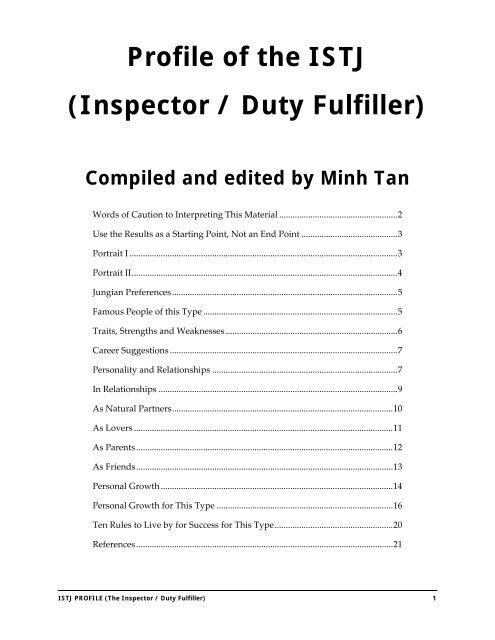
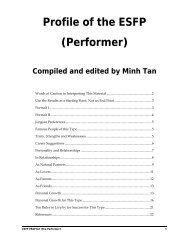
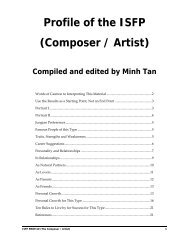
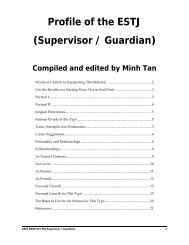
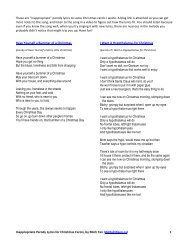
![The Water Is Wide, Traditional [ Capo III in F ] - Digital Citizen](https://img.yumpu.com/36365690/1/190x146/the-water-is-wide-traditional-capo-iii-in-f-digital-citizen.jpg?quality=85)
